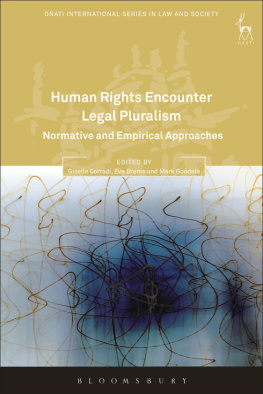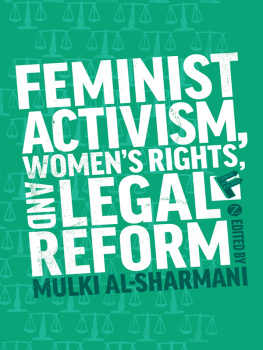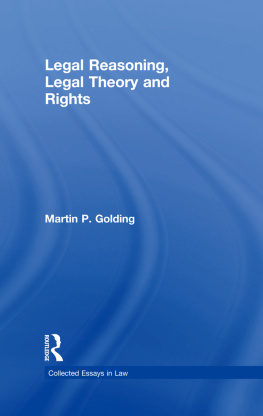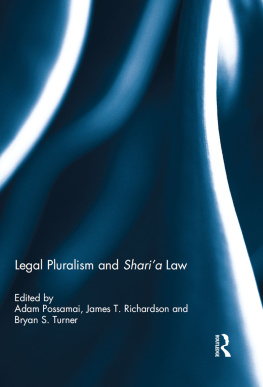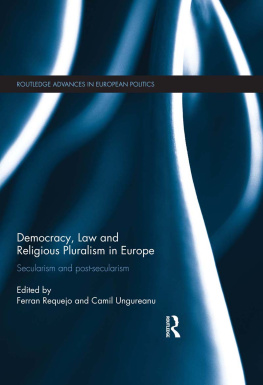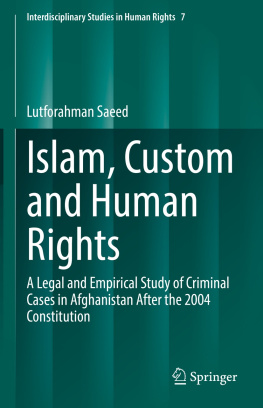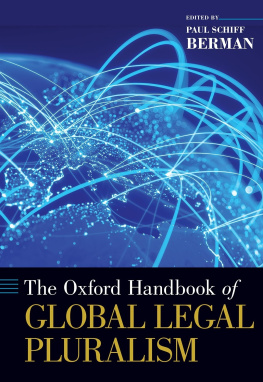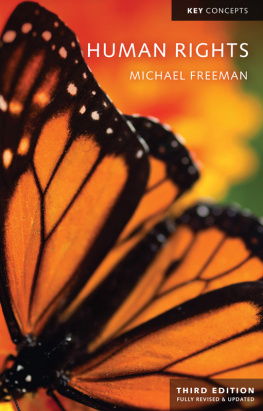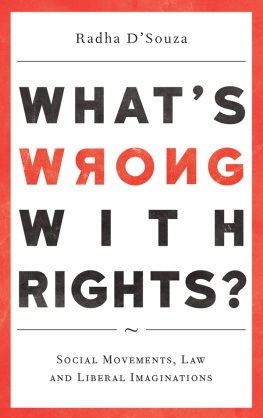Table of Contents

HUMAN RIGHTS ENCOUNTER LEGAL PLURALISM
This collection of essays interrogates how human rights law and practice acquire meaning in relation to legal pluralism, ie, the co-existence of more than one regulatory order in a same social field. As a social phenomenon, legal pluralism exists in all societies. As a legal construction, it is characteristic of particular regions, such as post-colonial contexts. Drawing on experiences from Latin America, Sub-Saharan Africa and Europe, the contributions in this volume analyse how different configurations of legal pluralism interplay with the legal and the social life of human rights. At the same time, they enquire into how human rights law and practice influence interactions that are subject to regulation by more than one normative regime. Aware of numerous misunderstandings and of the mutual suspicion that tends to exist between human rights scholars and anthropologists, the volume includes contributions from experts in both disciplines and intends to build bridges between normative and empirical theory.
Oati International Series in Law and Society
A SERIES PUBLISHED FOR THE OATI INSTITUTE FOR THE SOCIOLOGY OF LAW
General Editors
Rosemary HunterDavid Nelken
Founding Editors
William L F FelstinerEve Darian-Smith
Board of General Editors
Carlos Lugo, Hostos Law School, Puerto Rico
Jacek Kurczewski, Warsaw University, Poland
Marie-Claire Foblets, Leuven University, Belgium
Ulrike Schultz, FernUniversitt, Germany
Recent titles in this series
European Penology?
Edited by Tom Daems, Dirk van Zyl Smit and Sonja Snacken
Rights and Courts in Pursuit of Social Change
Legal Mobilisation in the Multi-Level European System
Edited by Dia Anagnostou
Womens Rights to Social Security and Social Protection
Edited by Beth Goldblatt and Lucie Lamarch
Delivering Family Justice in the 21st Century
Edited by Mavis Maclean, John Eekelaar and Benoit Bastard
Regulatory Transformations
Rethinking Economy-Society Interactions
Edited by Bettina Lange, Fiona Haines and Dania Thomas
Life Imprisonment and Human Rights
Edited by Dirk van Zyl Smit and Catherine Appleton
Trust in International Police and Justice Cooperation
Edited by Saskia Hufnagel and Carole McCartney
Human Rights Encounter Legal Pluralism
Edited by Giselle Corradi, Eva Brems and Mark Goodale
For the complete list of titles in this series, see
Oati International Series in Law and Society link at
www.bloomsburyprofessional.com/uk/series/
onati-international-series-in-law-and-society
Human Rights Encounter
Legal Pluralism
Normative and Empirical Approaches
Edited by
Giselle Corradi, Eva Brems and Mark Goodale
Oati International Series in Law and Society
A SERIES PUBLISHED FOR THE OATI INSTITUTE
FOR THE SOCIOLOGY OF LAW

OXFORD AND PORTLAND, OREGON
2017
We would like to express our gratitude to Emily Braggins and the staff at Hart Publishing for their kind assistance during the production of this book. We are also very grateful to the staff at the International Institute for the Sociology of Law in Oati. Their support in the organization of the workshop How Does legal Pluralism Interplay with the Promotion of Human Rights?, which took place on 2 and 3 May 2013, is very much appreciated. In particular, we wish to thank Malen Gordoa for her invaluable help before and during the meeting. The exchanges and reflections that took place during that encounter led to the publication of this volume. We would like to thank the participants in the workshop, most of whom are the authors of this collection, for their insightful contributions during the discussions and for their commitment to this project and scholarly debate. Finally, we acknowledge with gratitude a grant from the Research Foundation Flanders (FWO) for the research project Reconciling Human Rights and Customary Justice, and of the Belgian Federal Public Planning Service Science Policy (BELSPO) for the research project The Global Challenge of Human Rights Integration: Toward a Users Perspective.
Eva Brems is Professor of Human Rights Law and Co-founder of the Human Rights Centre of Ghent University.
Catherine Buerger is a PhD candidate at the Department of Anthropology of the University of Connecticut.
Giselle Corradi is a postdoctoral researcher at the Human Rights Centre of Ghent University.
Ellen Desmet is Research Coordinator at the Human Rights Centre of Ghent University and a postdoctoral researcher at the Law and Development Research Group of Antwerp University.
Mark Goodale is Professor of Cultural and Social Anthropology at the University of Lausanne.
Felipe Gmez Isa is Professor of Public International Law and Researcher at the Pedro Arrupe Institute of Human Rights of the University of Deusto.
Anne Hellum is Professor and Director of the Institute of Womens Law at the Department of Public and International Law of Oslo University.
Kari Henquinet is Director of the Peace Corps Masters International Programs and Senior Lecturer at the Department of Social Sciences of the Michigan Technological University.
Andre Hoekema is Emeritus Professor of Sociology of Law at the Law Faculty of the University of Amsterdam.
Rosalie Katsande is Senior Lecturer at the Southern and Eastern African Regional Centre for Womens Law of the University of Zimbabwe.
Kim Lecoyer is a PhD candidate at the Human Rights Centre of Ghent University.
Olivier Struelens is a researcher at the Centre of History and Anthropology of Law of the Free University of Brussels.
Barbara Truffin is Professor of Law and Anthropology and Member of the Centre of History and Anthropology of Law of the Free University of Brussels.
Human Rights and Legal Pluralism:
Four Research Agendas
GISELLE CORRADI
O VER THE PAST two decades, scholarly endeavours to understand social and cultural diversity in relation to human rights have shifted from concerns over universalism and relativism towards the analysis of how human rights operate in different contexts, and with which effects. A number of reasons explain this. In the first place, one could say that the sharpest edges of the so-called universality debate have been polished. On the one hand, human rights scholars have advanced critical approaches to universality (An-Naim 1995; Bell et al 2001; Brems 2001; Donnelly 2007, 1984). Rather than a priori given, the universal legitimacy of human rights may be constructed a posteriori. Since human rights standards are flexible and evolve, they can become responsive to diverse realities. For example, existing rights may acquire novel interpretations and new rights may be endorsed (Brems 2001). On the other hand, anthropologists have dismissed reified conceptions of culture that portray it as static, consensual and self-contained (Cowen et al 2001; Merry 1998, 2003; Preis 1996; Wilson 1997). Both material and immaterial aspects of culture, such as practices, habits, symbols and systems of meaning, have been shown to be reproduced, modified, acquired and rejected within histories of contact and exchange, embedded in relationships of unequal power.Although it is possible that tension exists between aspects of cultural traditions and certain standards, or even the entire idea of (human) rights, this perspective allows us to focus on diachronic processes of co-constitution and change (Merry 1997, 2003, 2010). In addition, a number of scholars have reflected on how areas of tension could be resolved. They propose intercultural dialogues as means to redefine culture and human rights, and consider how epistemological bias and power differentials across and within social groups interplay with these undertakings (An-Naim 1995; Eberhard 2002; Santos De Sousa 2002).

